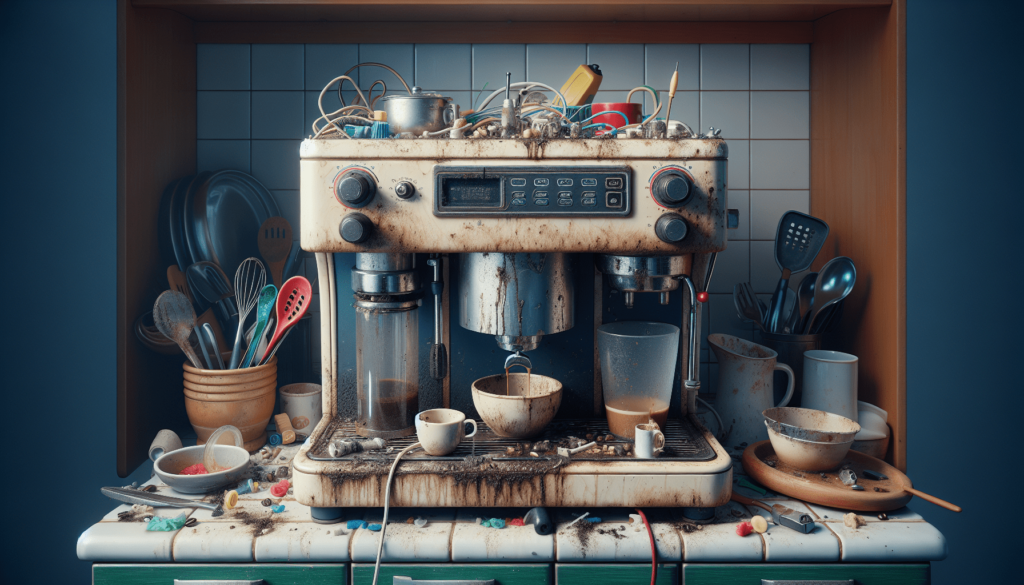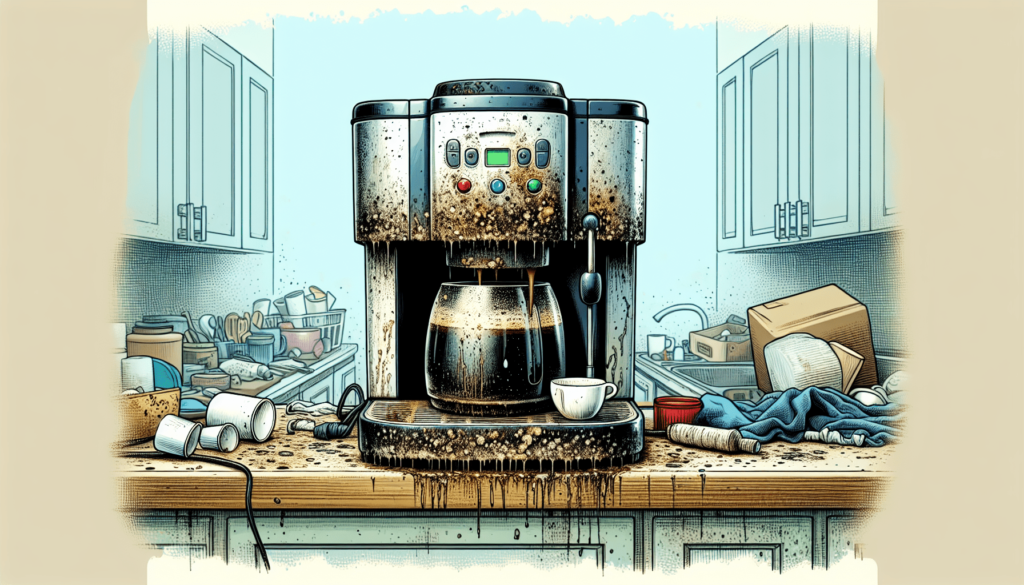Do you ever wonder what could happen if you don’t clean your coffee machine regularly? Your morning cup of joy could turn into a health hazard, and your machine’s lifespan could drastically shorten. Keeping your coffee machine clean isn’t just about aesthetics or taste; it’s key to ensuring your coffee stays fresh and your appliance functions correctly. Let’s explore the various consequences of neglecting this essential maintenance.

Health Risks
Your coffee machine is a breeding ground for bacteria, mold, and other harmful microorganisms if neglected. These can pose significant health risks over time.
Bacteria Build-Up
Avoiding regular cleaning allows bacteria to accumulate in your machine. These bacteria can contaminate your coffee, leading to gastrointestinal issues, food poisoning, or other infections. Drinking coffee made from an unclean machine ultimately risks your health.
Mold and Mildew
Damp environments like the inner parts of your coffee machine are ideal for mold and mildew to thrive. Not only do they affect the taste of your coffee, but inhaling mold spores can also be dangerous, causing respiratory problems, allergies, or infections.
Allergens and Toxins
Old coffee grounds left in the machine can become home to allergens and toxins over time. These can exacerbate allergies and even lead to more severe health issues if consumed regularly.
Impact on Taste
An unclean coffee machine can drastically affect how your coffee tastes, leaving you with a cup that is far from enjoyable.
Bitter and Stale Taste
Residual oils and coffee grounds can build up, making your coffee taste bitter and stale. This not only spoils your experience but also wastes good-quality coffee beans that would otherwise make a splendid cup.
Impaired Aroma
The accumulation of old coffee residues can soak up flavors that interfere with the fresh aromas of new coffee. You won’t get the full sensory pleasure that a freshly brewed cup of coffee should provide.
Mineral Deposits
Hard water can leave mineral deposits in your machine. Over time, these deposits accumulate and can compromise the taste and quality of the coffee brewed, giving it an off-putting and metallic flavor.
Machine Performance
Neglecting to clean your coffee machine can negatively impact its performance and longevity.
Clogging and Blockages
Coffee grounds, oils, and mineral deposits can clog the internal components of your machine, making it work harder than it should. This reduces efficiency and can eventually cause it to stop working altogether.
Wear and Tear
Regular cleaning helps maintain the machine’s components in optimal condition. Without it, parts are more likely to wear out faster, requiring frequent repairs or replacements, and significantly reducing the machine’s lifespan.
Energy Efficiency
A dirty machine has to work much harder to brew coffee, consuming more energy. This can lead to higher electricity bills and a bigger carbon footprint.
Economic Impact
Not cleaning your coffee machine can also have financial consequences, affecting everything from your grocery bills to the amount of money you spend on repairing or replacing your machine.
Increased Coffee Use
A dirty coffee machine often produces subpar coffee, which may lead you to use more coffee grounds to get the desired flavor. Over time, this increases the amount you spend on coffee beans.
Repair Costs
Clogged and overworked machines are prone to breakdowns. Repairs can be costly and inconvenient, especially if they become a frequent necessity due to ongoing neglect.
Replacement Costs
In extreme cases, neglecting the cleanliness of your machine might lead to its untimely demise. Machines can be an expensive investment, and having to replace them frequently is not financially sustainable.

Environmental Concerns
The consequences of not cleaning your coffee machine extend to environmental aspects too.
Waste Generation
Consuming more coffee because of poor taste or replacing broken machines frequently contributes to waste. Coffee grounds, disposable filters, and broken machines piled up in landfills have a considerable environmental impact.
Higher Energy Consumption
As mentioned earlier, a dirty machine consumes more energy, indirectly contributing to increased carbon emissions. A clean and efficient machine is not only good for your pocket but also for the planet.
Proper Cleaning Techniques
It’s essential to know how to clean your coffee machine appropriately to avoid the adverse effects discussed above.
Daily Maintenance
- Empty Coffee Grounds: After every use, empty the coffee grounds and rinse the filter basket.
- Rinse the Carafe: Rinse the carafe with warm water and soap to remove any leftover coffee residues.
Weekly Cleaning
- Clean the Water Reservoir: Mix a solution of vinegar and water (1:1 ratio) and run it through the machine to descale any mineral build-up. Follow up with two cycles of plain water to remove the vinegar taste.
- Wipe the Exterior: Use a damp cloth to wipe down the exterior of the machine, removing dirt and grime.
Monthly Deep Cleaning
- Disassemble the Machine: Remove all removable parts and soak them in warm, soapy water for thorough cleaning.
- Clean the Internal Components: Use a specialized coffee machine cleaner or a vinegar solution to clean the internal parts of the machine. Regularly changing water filters if your machine has one is also advisable.
Cleaning Frequency Checklist
Keep track of your cleaning routine with this handy checklist:
| Task | Frequency |
|---|---|
| Empty Coffee Grounds | Daily |
| Rinse the Carafe | Daily |
| Descale Water Reservoir | Weekly |
| Wipe the Exterior | Weekly |
| Deep Clean | Monthly |
Recommendations for Cleaning Products
Choosing the right cleaning products can make a significant difference in the effectiveness of your cleaning routine.
Vinegar Solutions
A simple and effective cleaning solution, vinegar is particularly good for descaling mineral deposits.
Specialized Coffee Cleaners
Many brands offer specialized cleaners designed specifically for coffee machines, ensuring you get a thorough clean without damaging any components.
Dish Soap
For daily and weekly maintenance, regular dish soap works wonders for cleaning removable parts and the carafe.
Microfiber Cloths
Microfiber cloths are excellent for wiping the exterior of your machine without scratching surfaces.
The Importance of Following Manufacturer Guidelines
Always refer to your coffee machine’s user manual for specific cleaning instructions and recommendations.
Protecting Your Warranty
Failing to follow the manufacturer’s guidelines can void your warranty, potentially leading to out-of-pocket repairs or replacements.
Optimal Machine Performance
Manufacturers provide cleaning instructions designed to keep your machine running at its best. Ignoring these can result in subpar performance and a shorter lifespan for your machine.
In Conclusion
Neglecting to clean your coffee machine has far-reaching consequences, from serious health risks to financial burdens and environmental impact. Regular and thorough cleaning, following manufacturer guidelines, and using appropriate cleaning products are crucial steps in ensuring that your coffee machine performs optimally, your coffee tastes great, and the appliance lasts as long as possible.
Taking a little time to clean your coffee machine regularly ensures you enjoy every cup without worry, making the most of your investment and contributing positively to your well-being and the environment. So, make it a habit—you’ll thank yourself every morning with each delicious and safe sip of coffee.
